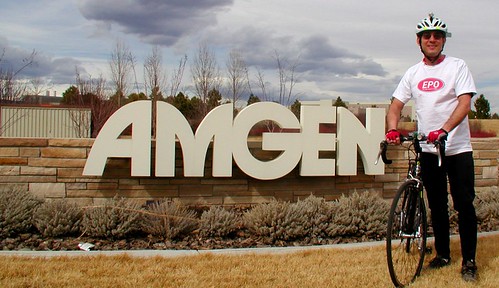
That's what it says on the t-shirt I bought from Velochimp. While we were taking these photos an Amgen employee came up and talked to us; she didn't seem too amused. This Amgen factory in my city is where rhEPO is manufactured. The location of this factory at the corner of Airport Road and Nelson Road in Longmont is also along a very popular route for road cyclists in Boulder County.
Perhaps I shouldn't treat this so lightly -- people die from EPO abuse. Their blood gets too thick and they get heart attacks. I want to make it clear that I am absolutely against doping in athletic competition.

I still find it ironic that Amgen, a manufacturer of EPO, took it upon themselves to sponsor the Tour of California (and that the promoters allowed it!)...
ReplyDeleteI agree BC. And although I am not a fan of NASCAR (cycling is much more interesting to me), they realized their old sponsor of the race series (Busch beer) wasn't a good idea and switched away from it.
ReplyDeleteAMGEN sponsoring the Tour of California is almost like Marlboro sponsoring an American Lung Association event, it doesn't make ANY sense.
Michael, there is still the NASCAR Busch series. Going strong!
ReplyDeletehttp://www.nascar.com/series/bg/
BC - I was very conflicted about this sponsorship, too. As someone who has worked on the organizing end of events, I know how hard it is to get sponsorship. You fight for every single dollar. I guess I can't blame the organizers for taking the money when it came. However, this seems to be a huge conflict of interest. Not to mention, what would have happened had a racer tested positive during this race? Yikes!
I have to disagree. The fact that Amgen is the producer of a drug that is widely abused among professional cyclists is a legitimate reason for the sponsorship (if they go about addressing the problem in the right way). Almost all cyclists are aware of EPO, but I would be willing to bet that some do not know that it is a drug that has legitimate medical purposes. This sponsorship gives the company the opportunity to educate the cycling public about the drug and to stress the dangers of its improper use. If a rider had tested positive, I think the sponsors would have done just that. I think it is a safe bet to assume that they anticipated such a possible scenario and prepared a response in advance.
ReplyDeletevery cool
ReplyDeletewhen ever an retired pro athlete dies in their 40's
well, it should make us think
measure the loss to gain
wouldn't be more fun for athletes to play fair
do they all relate to Rosie Ruiz?